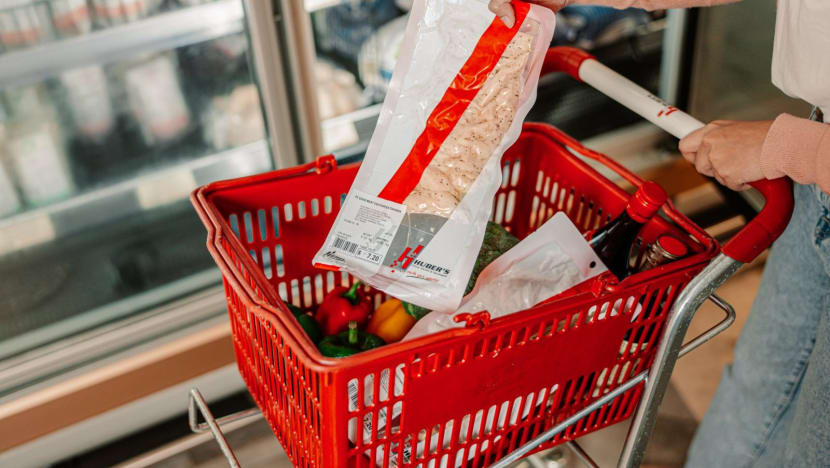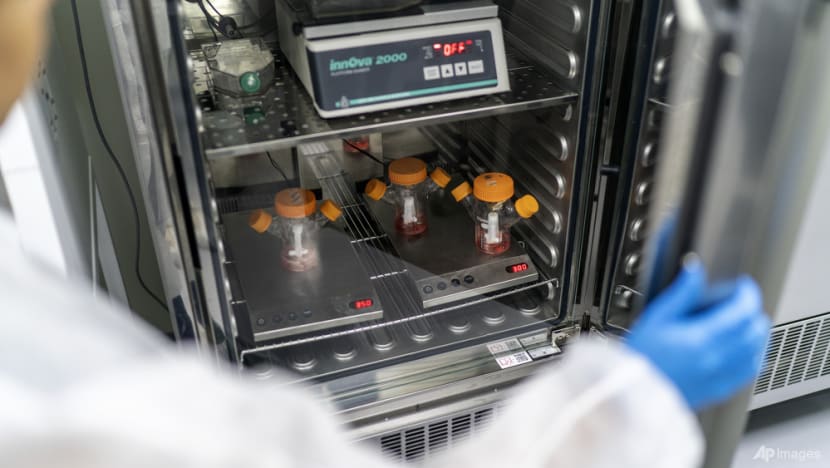After a promising beginning, is Singapore's cultivated meat industry on the way to the slaughterhouse?
What is next for the nascent industry that seemed off to such a good start?

This audio is generated by an AI tool.
SINGAPORE: It was June 2022, and the lab-grown meat industry looked like it had a sizzling future.
The largest cultivated chicken meat facility in Asia broke ground in Singapore, with a 30,000 sq ft complex at Bedok Food City, set to produce "tens of thousands of pounds" of meat a year.
The company behind this audacious venture was US-based Eat Just, who had plans to sell lab-grown chicken meat under the label Good Meat.
Eat Just representatives were joined by Singapore officials, including Minister for Sustainability and the Environment Grace Fu, at the groundbreaking ceremony.
Indeed, in October 2022, the government announced it had set aside fresh funding of S$165 million (US$122 million) to accelerate R&D in sustainable urban food production, future foods, and food safety science and innovation.
This was over and above an initial S$144 million of research funding in 2020.
Singapore was also the first country to approve the sale of lab-grown meat, with Huber's Butchery in Dempsey Hill being the only restaurant in the world selling lab-grown meat back in early 2023.
But in two short years, the industry appears to be slowing down.
In March this year, Eat Just put its lab-grown meat production at the Bedok facility on hold, the Straits Times reported. Huber’s Butchery stopped offering the product in December last year.
In the same month, it was reported that Singapore-based lab-grown seafood startups Shiok Meats and Umami Bioworks were merging.
And it is not just here that the industry is slowing down. A New York Times article in February detailed the decline of the industry – one which had a bright start with investors pouring over US$3 billion into the industry between 2016 and 2022.
However, a mix of unrealistic optimism from investors, followed by the realisation that the science behind the product could not match consumer demand for low prices and higher volumes of production, has left the entire industry in limbo.
In Singapore, Shiok Meats co-founder Sandhya Sriram wrote an emotional LinkedIn post last May about the painful process of letting 50 per cent of her staff go in 2023, and the online abuse she endured in the process.
She spoke about the enthusiasm investors and the media had for her planned product of lab-grown crustacean meat such as crab and lobster, but her company, like many other cultivated meat firms, soon met the perennial challenge of scaling production.
This challenge continues to confound her firm, she told CNA, but it is a challenge it has more confidence in tackling through the merger with Umami Bioworks.
The Singapore Food Agency (SFA), the statutory board overseeing food safety and security, along with other agencies, said Singapore remains an attractive location for cultivated meat startups.
“Our proximity to the large Asia market and the robust food safety regulatory system also draw startups to establish their R&D and pilot manufacturing in Singapore,” said SFA in a joint response with Enterprise Singapore (EnterpriseSG) and the Economic Development Board (EDB) to CNA's queries.
“The conducive environment here allows them to test their technology and demonstrate commercial viability of their products.”
Despite the challenges, some cultivated meat firms are not backing down. Eat Just announced on Wednesday (May 15) that it will start selling a hybrid meat, using a lower-cost formulation with plant protein and just 3 per cent lab-grown chicken.
One expert believes that the successful scaling and production of lab-grown meat could be a matter of necessity as the current production of meat could become unsustainable in generations to come.
“The truth is that the livestock industry is not sustainable … we have to acknowledge this at one point, and so this science will go forward when (lab-grown meat) is globally accepted,” said Associate Professor Alfredo Franco-Obregon from the National University of Singapore (NUS) Institute for Health Innovation and Technology.
Assoc Prof Franco-Obregon, who is in his 60s, said this mainstream acceptance may not even happen in his lifetime, but he thinks it is inevitable.
“It will eventually be realised, because of the urgency of it.”
INDUSTRY PLAYERS QUIETLY OPTIMISTIC
Lab-grown meat companies here remain cautiously optimistic – and believe that the heyday of the cultivated meat industry is yet to come.
Asked about their pause in production, a spokesperson from Eat Just, which the Good Meat label is under, said that it is still business as usual.
Ms Carrie Kabat, director of global communications at Eat Just, said: “The pause is part of our normal operations since we began producing and serving in Singapore in 2020. We produce and pause, produce and pause.”
She said this is a "campaign-style approach" to producing lab-grown meat.
Eat Just's hybrid meat consisting of 3 per cent cultivated chicken meat went on sale at Huber’s Butchery on Thursday, priced at S$7.20 for a 120g package.
Ms Kabat projected that in 2024, Eat Just will produce three times more product than any year before, adding that this is about 10 times what the rest of the cultivated meat industry has produced up to this point.

However, other lab-grown meat firms were more conservative with their sentiments.
Dr Sriram from Shiok Meats admitted that the firm had faced scale-up issues, but this was “not surprising at all”.
“It is biotechnology and food technology coming together and some scale-up challenges are expected – nothing that cannot be solved over time.”
She also explained the rationale of its merger with Umami Bioworks, which is to increase the scale and speed of production.
“The team has been committed and working on solving the challenges and now will continue (to do so), along with Umami's expertise,” said Dr Sriram.
As to how quickly scale can be achieved, she said that “a lot more research and development” needs to be done before this is possible.
“I have been saying in every media interview and from day one that it will take at least another decade for cultivated meat or seafood to scale and for it to be available for the consumers to buy easily in restaurants and supermarkets,” she said.
“Until then, it will be a niche and premium market.”
Echoing these sentiments, the authorities said the lab-grown meat industry is still nascent both globally and in Singapore.
“The commercialisation of cultivated meat products involves extensive research and development to ensure technology viability, food safety and scalability, as well as being able to sustain the investments necessary to bring these innovations to market,” said the agencies in their joint statement.
“Currently, novel food is not a significant contributor to our food supply.”
They added that early-stage innovative startups in the lab-grown meat space can also tap the various schemes under StartupSG to gain access to financing, mentorship, facilities and talent.
StartupSG provides entrepreneurs with resources and support to help them build their startups.
FIRST HURDLE: GETTING THE MEAT ON SHELVES
While there is still some optimism, experts were quick to point out several fundamental issues when it comes to growing meat cells.
The biggest challenge is that there is no sufficiently cheap and fast solution to growing lab-grown meat yet.
Dr Viknish Krishnan-Kutty, the founder of Cellivate technologies, which offers plant-based and cell-based solutions to replace the slaughter of animals, said that the price of production is at the forefront of consumers' minds.
Over the last two years the price has gone down much, he said.
While in 2022 the cost of 1kg of lab-grown meat could range between US$100 and US$1,000, the production cost of 1kg of lab-grown meat now is still over US$100, he estimates.
The reason why prices have not fallen is that companies have struggled to produce the meat at scale.
For instance, with some bovine cells, they can take 24 hours or more to multiply into two cells, and another 24 hours to become four cells.
“They are fundamental properties of the cells themselves, that you cannot tweak too much,” said Dr Viknish.
There are even ethical concerns, shared Assoc Prof Franco-Obregon from NUS, whose research is being licensed by Dr Viknish’s Cellivate.
He said that the mainstream method in supporting the growth of lab-grown meat is using fetal bovine serum. This serum is extracted from fetuses taken from pregnant cows, and is rich in “growth factors”, which is a protein or hormone that stimulates cell growth.
“Before slaughter (of a cow), you take its fetus, and you bleed the fetus and then you collect that serum, and you sell it in laboratories across the globe,” said Assoc Prof Franco-Obregon, who is also from the NUS Yong Loo Lin School of Medicine.
The mainstream production of lab-grown meat is a very inefficient process, but that’s “where the industry is situated at the moment”.
“It brings up issues of animal cruelty, and the beef industry is a huge source of greenhouse emissions and land use,” he said.
“All these factors tie in to making this not a viable option, that is not sustainable.”
To that end, Assoc Prof Franco-Obegron has invented a technology that does not need to use such a serum to stimulate cell-based meat production.
He is currently collaborating with Dr Viknish on this new technique that uses a magnetic field to stimulate growth in the meat, which he says is “competitive” with fetal bovine serum.
As much as he hopes for the success of the industry through such innovations, Dr Viknish acknowledges that progress will be slow.
“Our job is to help develop the technologies, but I think we have to be mindful of some of the bottlenecks that are inherent within the biology itself.”
The Singapore agencies said one potential solution to the biological limitations of lab-grown meat production is to produce hybrid meats instead, much like what Eat Just is doing.
"They are commercially more viable because of the lower costs of production as compared to pure cultivated meat," said SFA, EnterpriseSG and EDB.
"The mix of plant-based ingredients with cultivated meats, also addresses the issue of texture in plant-based meats, making these products taste and feel more like real meat."

SECOND HURDLE: LUKEWARM RECEPTION FROM F&B SECTOR
Lab-grown meat has had a mixed reception from F&B establishments in Singapore.
Huber’s Butchery, the first in the world to sell lab-grown meat on shelves, said it received glowing reviews of the product.
“The response for the cultivated meat was overwhelming and the response from customers was very positive,” executive director Andre Huber told CNA.
He added that the challenge had never been the demand, but the supply of the product.
“The supply of cultivated meat to us is limited … We always sold out what we could get,” he said. “I’m sure if supply quantities increased, we could sell more.”
For other restaurants that have not had lab-grown meats on their menus, their owners say it is an environmentally sound concept but they are afraid of high costs and aversion from their customers.
“Some customers may embrace (cultivated meat), so if there is enough demand, then we will do it, provided it is operationally cheaper,” said Mr Samuel Yik, founder of Chinese restaurant chain Dian Xiao Er.
He added that on top of prohibitive costs, he is sceptical if people would be willing to try lab-grown meat due to uncertainties about longer-term health effects or ethical considerations.
The three agencies said any food product sold here needs to have regulatory approval.
“Companies developing novel food, such as cultivated meat, are also required to conduct safety assessments of their products and put in place systems and processes to ensure food safety,” they said.
“Cultivated meat is required to undergo pre-market approval before being allowed for sale in Singapore.”
For other F&B establishment owners such as Colin Chen, co-founder of cafe chain Hello Arigato, the concern is his customer’s perception of such novel foods.
In some of his previous outlets, he used to have similarly novel options such as plant-based meat.
“It’s sexy, but actually adoption or order rate from customers is not that great … the cost was just too high, and customers didn't seem to understand the premium,” he said.
He believes that should cultivated meat go mainstream, it would face similar issues.
“Maybe fine dining establishments can pull it off, but for the casual dining segment, it is a little tough.”
THIRD HURDLE: GAINING MAINSTREAM ACCEPTANCE
Indeed, another big challenge the lab-grown meat industry faces is to gain mainstream acceptance, say experts.
A survey of over 1,000 Singapore residents by Nanyang Technological University (NTU) found that there was broad support of the development, sale, government funding and regulation of the cultivated meat industry here, but that the intention to consume it was not as strong.
This could be because many are ambivalent or have neutral attitudes towards lab-grown meat, said Dr Shirley Ho, who led the team conducting the study.
“Potentially due to their relative unfamiliarity with the technology or product, they are still hesitant to try cultivated meat currently,” said Dr Ho, who is the president's chair professor in communication studies at NTU's Wee Kim Wee School of Communication and Information.
“The sizable number of neutral attitudes toward cultured meat indicate that there is room for public messaging to play a part in educating and informing the public on cultivated meat.”
She said public perceptions need to be addressed as it is “just as important as overcoming technical and regulatory challenges in the development of novel food technologies”.
The authorities said in their statement that consumer acceptance of novel food such as lab-grown meat would take time.
EnterpriseSG partnered with caterer SATS to showcase novel foods at the Food & Hotel Asia tradeshow last month, so that international buyers and tradeshow visitors can be acquainted with these products.
“This allows tradeshow visitors and international buyers to get acquainted with novel ingredients and products,” said the agencies.
Dr Viknish said that ultimately, he does not think that traditional meat from live animals would ever lose its place to cultivated meat, barring a major disruption in the industry.
“As long as traditional meat is there, that will be mainstream,” said Dr Viknish. “Our goal is that cultivated meat becomes an option, just like how you have canned meat and minced meat.
“That will be a very good start, but to say that it will replace pork and beef, we are not there yet.”
Editor's note: This article originally said that the Food & Hotel Asia tradeshow happened last year. In fact, it happened last month. We are sorry for the error.










